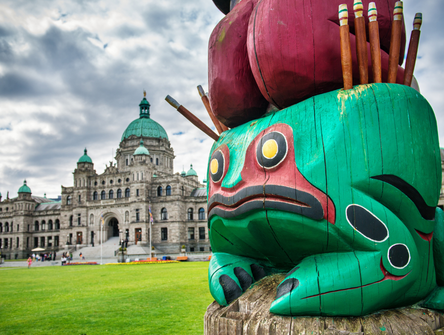Extradition ruling almost certain to be litigated further
Huawei CFO Meng Wanzhou loses the first round in her fight against extradition. But the decision ultimately falls to the Attorney-General.
.jpg?ext=.jpg)
It's been 160 years since a Toronto court ordered John Anderson, an escaped slave, sent back to Missouri to stand accused of murdering a slave owner in self-defence.
More than a century-and-a-half hasn't changed the principles of the law — and politics — around extradition.
The B.C. Supreme Court, on Wednesday, denied a motion from Meng Wanzhou, the Chief Financial Officer of Chinese tech giant Huawei, to stave off her own extradition hearing.
Meng and Anderson's circumstances could not be any different. But in both cases, the courts had to grapple with how to enforce an order from a foreign government whose laws are at odds with Canada's.
Meng is wanted in the United States for, allegedly, conspiring to circumvent American sanctions against Iran. According to that allegation, a Huawei subsidiary continued carrying on business in Iran, and Meng lied about it to the British bank HSBC to continue their commercial relationship.
She was arrested at the Vancouver airport in December 2018 by the RCMP on an extradition warrant, at the behest of the Americans.
Last February, the Trudeau government issued what is known as an "authority to proceed," which begins the legal process. Meng's team quickly moved to have the whole process thrown out, arguing that the Attorney-General can't pursue extradition.
Meng's counsel contended earlier this year that the extradition order failed the test of double criminality. Extradition can only happen in cases where, if the requesting nation were the one receiving the request, it would still be legally valid.
Since Canada no longer had sanctions in place on Iran, her lawyers argued, an extradition order stemming from breaking those sanctions cannot be valid.
The Attorney-General, on the other side, argued that the authority to proceed was ordered, not due to her violating sanctions, but because she engaged in fraud by deceiving HSBC about the nature of Huawei's business dealings in Iran. That put the bank in jeopardy of running afoul of the sanctions law themselves.
The court grappled with exactly how to thread that needle, much like how the pre-Confederation Court of Queen's Bench struggled with how to reconcile Anderson's alleged murder — certainly a crime in the Dominion of Canada — and America's continued acceptance of slavery.
In the end, the B.C. court charted a middle ground, bolting together aspects of both arguments. "The U.S. sanctions are part of the state of affairs necessary to explain how HSBC was at risk, but they are not themselves an intrinsic part of the conduct," Chief Justice Heather Holmes wrote, in effect acknowledging that the improper conduct can stem from a law that has no equivalent in Canada. Not doing so, Holmes wrote, would "limit Canada's ability to fulfill its international obligations in the extradition context for fraud and other economic crimes."
It's a decision that may yet be litigated against at her formal extradition hearing, and will undoubtedly lead to some scholarly debate. Gary Botting, a criminal lawyer in Vancouver and one of Canada's foremost experts on extradition, argues that the court should have either limited its decision to the question of fraud or considered the entire question of the sanctions. "Instead, she imported half the context," Botting says.
"She has come up with the least satisfactory decision and one that will almost certainly be challenged in the courts," he argues.
The Toronto court in 1860, however, made a similar determination. The court, then, found that the white slave-owner who confronted Anderson had acted lawfully. At the time, Missouri law authorized whites to stop any slave who was travelling with a permit.
It was not unanimous, however. Justice Archibald McLean, the lone dissenting justice on a panel of three, concluded: "I can never feel bound to recognize as law any enactment which can convert into chattels a very large number of the human race."
The decision, then, was considered by many as repugnant. Protests outside the courthouse erupted. A Black man, a former slave, would be sent back to his state for killing a man in self-defence.
At first, it seemed the Canadian courts would be put in their place — a writ of habeas corpus was issued in London, and the British court prepared to hold its own trial of Anderson.
The Court of Common Pleas solved the problem: The warrant, the chief justice of the court found, was defective. Anderson was ordered released.
The B.C. Supreme Court considered Anderson's case, contemplating whether it would be coming to, effectively, the same conclusion as the Queen's Bench, a century-and-a-half earlier.
"Even today, one could construct a scenario in which hypothetical foreign slavery laws could lead to conduct for which the equivalent Canadian offence would be fraud," Justice Holmes wrote. "Should the offensive character of the foreign laws play no part in the double criminality analysis?"
For one, she concluded, America's sanctions regime is not diametrically opposite Canadian legal values in the way slavery is. And, more relevant to the case at hand: "In the final phase of the extradition process the Minister of Justice is expressly required to refuse a surrender order for extradition if such an order would be 'unjust or oppressive.'"
Meng and her team still have ample room to fight her extradition order — there may be an appeal in this case, while she also contends that she was interrogated in violation of the Charter at the Vancouver airport. The Attorney-General must also convince a court that the evidence supports her extradition.
But the decision ultimately falls to the Attorney-General. As Botting points out, at the end of the day, "this is not a legal issue at all, really."
He contends that, while then-Attorney-General John A. MacDonald had used the courts as a way to find a legal avenue to avoid Anderson's extradition, the Trudeau government here has put the matter to the courts in an attempt to absolve itself of responsibility.
"If the minister isn't sure, in terms of whether not he has the right to send her back, then he should consult a judge," Botting says. "Unfortunately, we've moved away from the model intended by the Act."
Justice Minister David Lametti has still not indicated whether he would surrender Meng to the Americans. In a statement, officials from the Department of Justice wrote that "the Minister does not personally make any decisions related to an extradition proceeding until and unless the judge commits the person for extradition."
But, as Botting notes, "the Minister of Justice can stop this whenever he wants."


